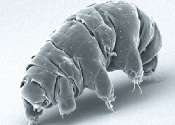Why do cats knead?
"Kneading" is when cats massage an object with the front paws, which extend and retract, one paw at a time.

"Kneading" is when cats massage an object with the front paws, which extend and retract, one paw at a time.
Plants & Animals
Dec 9, 2022
1
1015

New research provides insight about the bedrock scientific principle that mitochondrial DNA—the distinct genetic code embedded in the organelle that serves as the powerplant of every cell in the body—is exclusively passed ...
Cell & Microbiology
Sep 18, 2023
0
356

The largest marine predator that ever lived was no cold-blooded killer. A new analysis by environmental scientists from UCLA, UC Merced and William Paterson University sheds light on the warm-blooded animal's ability to regulate ...
Paleontology & Fossils
Jun 26, 2023
0
1752

One wasp species has evolved the ability to recognize individual faces among their peers—something that most other insects cannot do—signaling an evolution in how they have learned to work together.
Plants & Animals
Jan 27, 2020
4
9453

Modern humans left Africa some 60,000 years ago in the event known as "Out-of-Africa." In Asia, they coincided with the Denisovans, and that encounter may have led to confrontations and collaborations, but also various crossbreeding. ...
Evolution
Oct 30, 2023
1
366

Plump and ponderous, tardigrades earned the nickname "water bears" when scientists first observed the 0.02-inch-long animals' distinctive lumbering gaits in the 18th century. Their dumpy plod, however, raises the question ...
General Physics
Aug 27, 2021
3
1406

Strong fists for defending ourselves and opposable thumbs for work as fine as threading a needle—hand specialisation is widely believed to have given humans a major evolutionary advantage.
Evolution
Jul 14, 2015
33
2306

(Phys.org)—A trio of researchers with the University of St. Andrews in the U.K. has found what appears to be an evolutionary advantage for same-sex sexual behavior in fruit flies. In their paper published in Proceedings ...

On a beautiful fall day in 2019, Miranda Sinnott-Armstrong was walking down Pearl Street in Boulder, Colorado when something caught her eye: a small, particularly shiny blue fruit, on a shrub known as Lantana strigocamara. ...
Plants & Animals
Jun 10, 2022
0
221

(PhysOrg.com) -- Scientists studying imitative behavior have found that, just like people, dogs learn quickest by automatic imitation. Apart from the budgerigar, this is the first time automatic imitation has been demonstrated ...
Major depression is the leading cause of disability worldwide, and in 2000 was the fourth leading contributor to the global burden of disease (measured in DALYs); it is also an important risk factor for suicide. It is understandable, then, that clinical depression is thought to be a pathology — a major dysfunction of the brain. Yet the epidemiology of clinical depression is something of an outlier when compared to the epidemiology of major dysfunctions of other organs like the heart, liver, lungs and kidneys[citation needed]. In most cases, rates of organ dysfunction increase with age, with low rates in adolescents and young adults, and the highest rates in the elderly. These patterns are consistent with evolutionary theories of aging which posit that selection against dysfunctional traits decreases with age (because there is a decreasing probability of surviving to later ages).
In contrast to these patterns, prevalence of clinical depression is high in all age categories, including otherwise healthy adolescents and young adults. In one study of the US population, for example, the 12 month prevalence for a major depression episode was highest in the youngest age category (15–24 year olds). The high prevalence of depression is also an outlier when compared to the prevalence of major mental retardation, autism, and schizophrenia, all with prevalence rates about one tenth that of depression, or less.
The common occurrence and persistence of a trait like clinical depression with such negative effects early in life is difficult to explain. (Rates of infectious disease are high in young people, of course, but clinical depression is not thought to be caused by an infection.) Evolutionary psychology and its application in evolutionary medicine suggest how behaviour and mental states, including seemingly harmful states such as depression, may be past adaptations to recurring reproductive problems faced by our ancestors, actually having improved however disadvantageous in the modern world, the fitness of either the individual or their relatives. It has been argued, for example, that Abraham Lincoln's life-long depression was a source of insight and strength. Some even suggest that "we aren’t designed to have happiness as our natural default" and so a state of depression is the evolutionary norm.
The following hypotheses attempt to identify a benefit of depression that outweighs its obvious costs. All take as their starting point the fact that one of the most potent, well-established causes of major depression is a severe negative life event.
This text uses material from Wikipedia, licensed under CC BY-SA